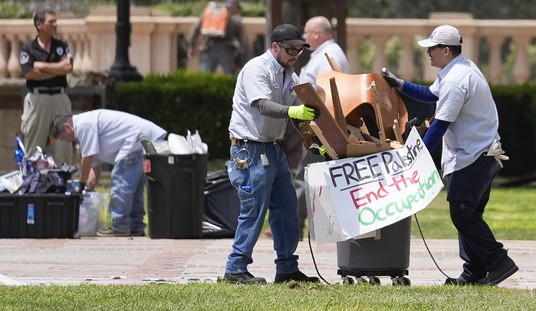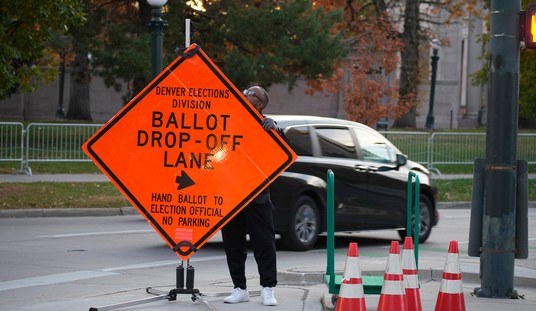With all due respect to Lone Survivor and Zero Dark Thirty (and I have paid mad respect to both), Clint Eastwood’s amazing American Sniper is the film for the war on terror.
But it’s more than that. It is a timeless American war movie that explores the necessity of having men who are–and bear the burden of being–really really good at killing bad guys.
In fact, this is easily one of the ten best American war movies of all time. (I won’t place it any higher than that until I’ve had the chance to see it again and let the initial emotional impact wear off; but right now, I can’t think of three I would rate above it.)
When I reviewed Chris Kyle’s book American Sniper, I called it the most unapologetic account of war since George S. Patton. But it’s not all swagger.
Eastwood both allows the character of Chris Kyle to speak to that unabashed pride in doing a necessary job — his warts-and-all honesty about how he neglected his family while letting the job consume him — and uses the tragic events that followed the publication of the book to show us how doing that job takes a toll.
The result is a shining example of material finding the perfect director. In many ways, Eastwood’s whole career has been leading up to this statement. It’s what Unforgiven couldn’t quite get to because it was merely about a previously vicious man sliding back into his old ways, even if his cause was just.
The film — like the book — opens as newly minted Navy SEAL sniper Chris Kyle takes a bead on a small Iraqi boy whose mother has just handed him a grenade and sent him running toward a squad of American Marines.
Then, while Kyle is waiting for that space between breaths, between heartbeats, that still moment of the trigger pull, we flash back to how he got there.
This is a perfectly executed and superbly made bio-pic. Despite the heroism it shows, it never lapses into hagiography or sappy preaching. Eastwood is clear-eyed throughout, and confident at letting his story tell itself.
American Sniper lives up to its title. This is an intensely American film. Everything about Chris Kyle’s background, from hunting with his father, to the little country church, to wanting to be a cowboy, is not just Texas, it’s America.
From Sergeant York, to Audie Murphy, to Dick Bong (WWII’s ace of aces who also left combat only to die serving on the home front), to Chris Kyle, small-town, do-for-yourself America has produced these men for whom taking up arms to protect their country just comes naturally (even, eventually, for the Quaker, York).
The motivation is summed up in a talk Chris Kyle’s father gives at the dinner table — a speech many American fathers have given their sons (and many more should), but rarely with this perfect an analogy.
Chris has had trouble in school for beating up the bully who was picking on his younger brother — but he is not in trouble at home. His father explains there are three kinds of people in the world: Sheep, who can’t protect themselves; wolves; and sheepdogs, who protect the sheep. He expects his son, who has the ability, to be a sheepdog — and if he ever becomes a wolf, he will get an ass whooping he will never forget.
Later, when drinking away the memory of a cheating girlfriend and the Khobar Towers bombing news story comes up on television news, a hitherto aimless Chris Kyle knows exactly what he is supposed to do.
While American Sniper takes no firm position on the wisdom of the war in Iraq — various characters express varied opinions on that — it is very clear-eyed about the nature of the enemy, or, as Kyle refers to them as, “the f***ing savages.”
Not since The Deer Hunter has the enemy been as accurately portrayed in an American film as the bestial evil that they are, and without over-the-top Hollywood histrionics. The good guys have their flaws, but these bad guys have to be opposed — and killed in as large a number as possible.
There are four great battle-set pieces in American Sniper that are breathtakingly effective — and, thankfully, Eastwood knows how to give immediacy and a you-are-there feel to the scenes without the herky-jerky handheld camera gimmicks and incoherent quick-cut edits that lesser directors use to pull off a complicated scene.
At one point, Kyle’s sheepdog instincts take him off the rooftops — against orders — and down into the streets with the Marines. He knows his SEAL training has prepared him better for house-to-house combat and he can’t sit by without teaching them how to do it better.
Eastwood has been exploring these themes for years, imperfectly in Heartbreak Ridge, much better in The Outlaw Josey Wales, of course in Dirty Harry, and most recently (showing he understands the protective impulse of the American soldier) in Gran Torino, where this really was the under-explored theme.
The performances are all first rate (I’ll rave about Cooper in a minute) and it’s really about time that people realize the beautiful Sienna Miller is an actress of grit and grace.
So in the pantheon of great American war movies, where does American Sniper place? It’s more personal and emotionally shattering than even The Deer Hunter, because that great film spread its emotions around to the effect of the Vietnam War on a whole town.
It does an even better job of portraying the sacrifices and effects of war on the family of a warrior than We Were Soldiers.
And of course it is a more realistic look at a highly decorated soldier who performed at an almost superhuman level than either Sergeant York or To Hell and Back — and not just because of the allowances of modern filmmaking.
It’s hard to explain the greatness of Bradley Cooper’s performance, unless you have seen Chris Kyle’s interviews. But Cooper does not just inhabit his role, or give a great interpretation of a character — he disappears into it.
Sure, the muscle gain helps, because it keeps us from remembering this is svelte Bradley Cooper who has given so many memorable performances the last few years (and was the softer male character way back on TV’s Alias).
But watching American Sniper, you feel as though Chris Kyle was allowed to play himself — maybe better, since this is a more convincing portrayal than even Audie Murphy gave playing… Audie Murphy.
Which makes the tragic ending of this story all the more shattering. Eastwood’s choice at the end of American Sniper is almost as important as the one he makes at the beginning. At the screening I attended, there were gasps as a credit announced what happened to Kyle, muffled sobs during the real footage of his funeral that ran over the credits, and no one — and I mean no one — moved until the credits were done. As people filed out, it was as quiet and somber as if we had attended the funeral ourselves.
Seeing American Sniper is an American experience. Don’t miss it.
Also read: Feminist Mag Complains American Sniper Unfair …to Babies?









Join the conversation as a VIP Member